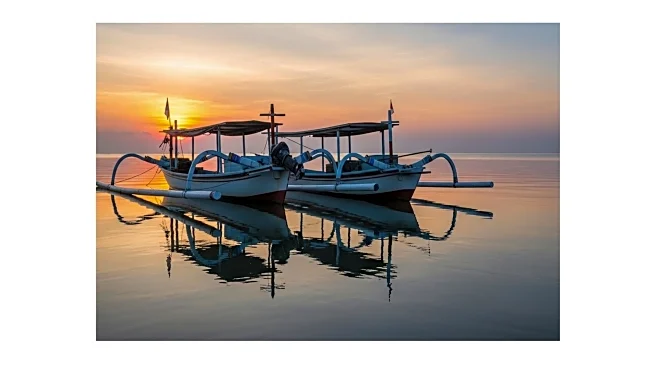What's Happening?
Nineteen Indonesian nationals have pleaded guilty to illegal fishing in Australian waters, as reported by the Darwin Local Court. The incidents occurred between September 7 and 11, 2025, when Australian authorities intercepted and apprehended Indonesian vessels fishing illegally in the Northern Territory. The Australian Border Force seized significant quantities of sea cucumbers, salt, and fishing equipment. The court imposed various penalties, including imprisonment and recognisance orders, on the fishers and vessel masters. The master of one vessel received additional imprisonment terms and a recognisance order due to previous offenses. All fishers will be deported to Indonesia after serving their sentences.
Why It's Important?
This case highlights the ongoing issue of illegal fishing in Australian waters, which poses a threat to marine biodiversity and the fishing industry. The enforcement actions taken by Australian authorities demonstrate a commitment to protecting marine resources and upholding international fishing laws. The penalties serve as a deterrent to future illegal activities, emphasizing the importance of legal compliance in international waters. The case also underscores the need for cooperation between countries to address illegal fishing and preserve marine ecosystems.
What's Next?
Following the court's decision, the Indonesian fishers will be deported after serving their sentences. The Australian government may continue to enhance surveillance and enforcement measures to prevent illegal fishing activities. There could be diplomatic discussions between Australia and Indonesia to address the root causes of illegal fishing and improve cooperation on maritime security. Additionally, the case may prompt further legal actions against other offenders involved in similar activities.
Beyond the Headlines
Illegal fishing not only affects marine biodiversity but also has economic implications for the fishing industry. The destruction of seized vessels at sea reflects strict enforcement policies aimed at deterring illegal activities. This case may lead to increased awareness and advocacy for sustainable fishing practices and international collaboration to protect marine resources.









